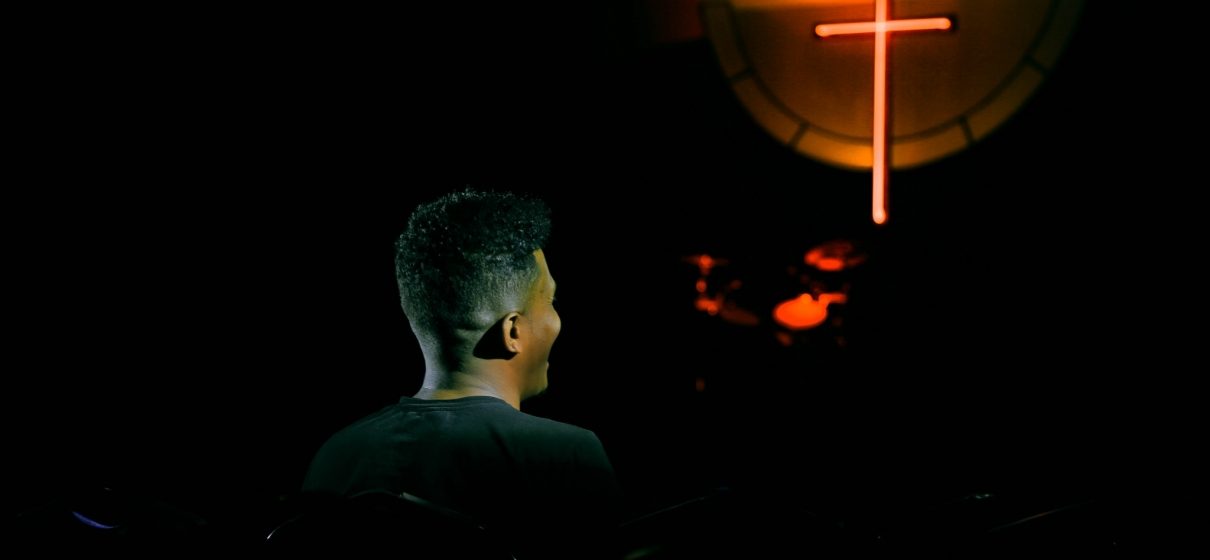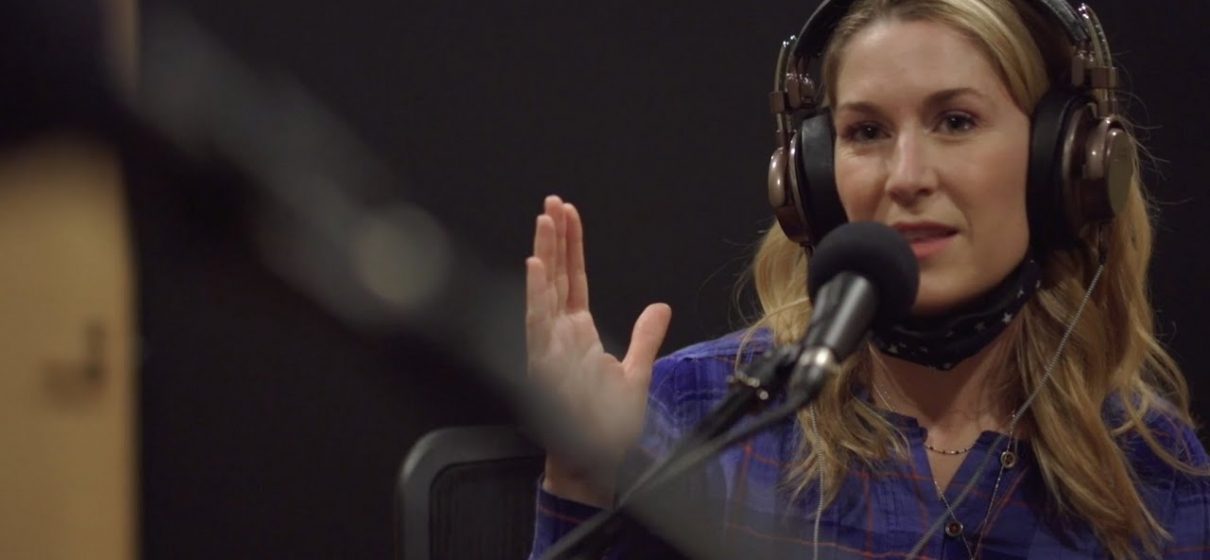As far as Josh Fasske knew, it was going to be another long and cold work night driving around the greater League City area.
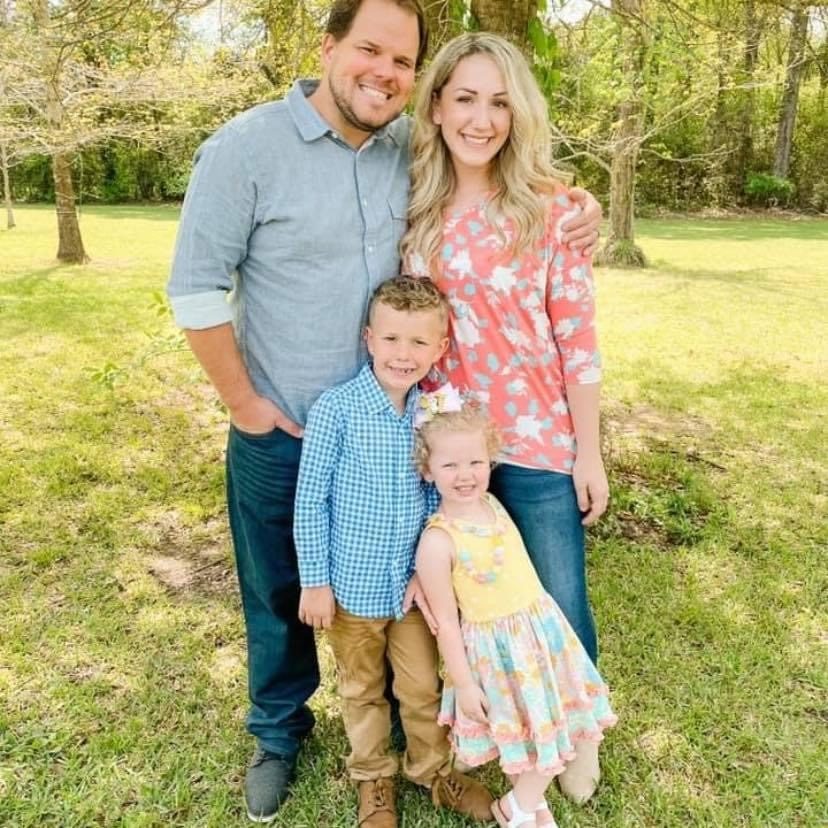 The last few days had passed like a whirlwind for him and his wife, Brittani, owners of Grand Slam Plumbing, a small business they started in 2017. As Winter Storm Uri wreaked havoc in League City, Josh and his small crew worked long days and nights and even into the early hours of the morning to restore running water to their customers.
The last few days had passed like a whirlwind for him and his wife, Brittani, owners of Grand Slam Plumbing, a small business they started in 2017. As Winter Storm Uri wreaked havoc in League City, Josh and his small crew worked long days and nights and even into the early hours of the morning to restore running water to their customers.
They were already slammed just a few days into the storm, and Josh was exhausted physically and mentally. Not only was he working around the clock to help panicked customers, but he and his wife and young children were displaced from their apartment as their building went without electricity and running water.
It was on such a night the week of the storm that Josh received a welcome surprise from fellow church member, Vijay Rajaji.
“I was at a job in Seabrook,” Josh recalled. “When Vijay got there, he sent me a text that said ‘Hey, come outside.’ I saw it and thought he sent it to the wrong person, so I called him. He said ‘Hey, come outside. I’ve got something for you.’”
Vijay had brought Josh food.
“Not just food,” Josh said, “it was a warm meal, which I wasn’t getting a whole lot of.”
Before Vijay left, he told Josh, “If you’re out and about, I’m going to be out and about. However long you’re doing this, I’m going to be bringing you food every night.”
And Vijay kept his promise.
***
Years ago, Sonia and Vijay Rajaji experienced one of the most traumatic events of their lives. Their first child, Maya, was born premature, just shy of 26 weeks gestation. She spent the next three-and-a-half months in the NICU and the remainder of her first year at home under strict guidelines in order to avoid any communicable illnesses.
Sonia and Vijay were fairly new believers attending Clear Creek Community Church. Neither had been raised in families that invited other people into their personal lives, but this new church life was challenging all that they understood about community. For five months, the people of Clear Creek — a few friends, but mostly strangers — brought meals to the Rajajis three times a week in order to serve them and help them get through that tough season.
“I thought we didn’t need it,” Sonia recalled. “I didn’t understand how meals help. After I came out of that season and out of the shock, I realized this is what church family is all about. This is about serving people even when they don’t think they need it. And it’s hard to take help.”
“That was the thing that really changed me,” Vijay added. “When you’re a new believer, you pick up everything by osmosis. You say what people say, you do what people do, and you think that’s the baseline. And so, because we were so new, my expectation became if you’re going through something, the church takes care of you, period. That’s just the expectation.”
Maya thrived, and Sonia and Vijay continued growing in their faith at Clear Creek. Later, they took the Financial Peace University course in order to gain a better understanding of how to get out of debt as well as how to honor God with their financial resources.
“One of the things that came out of that for us was creating a line item in our budget for generosity,” Sonia said. “When we have it in our budget, it gives us freedom to be generous. God has given us all this financial security. So, part of our responsibility as believers is to show people his love.”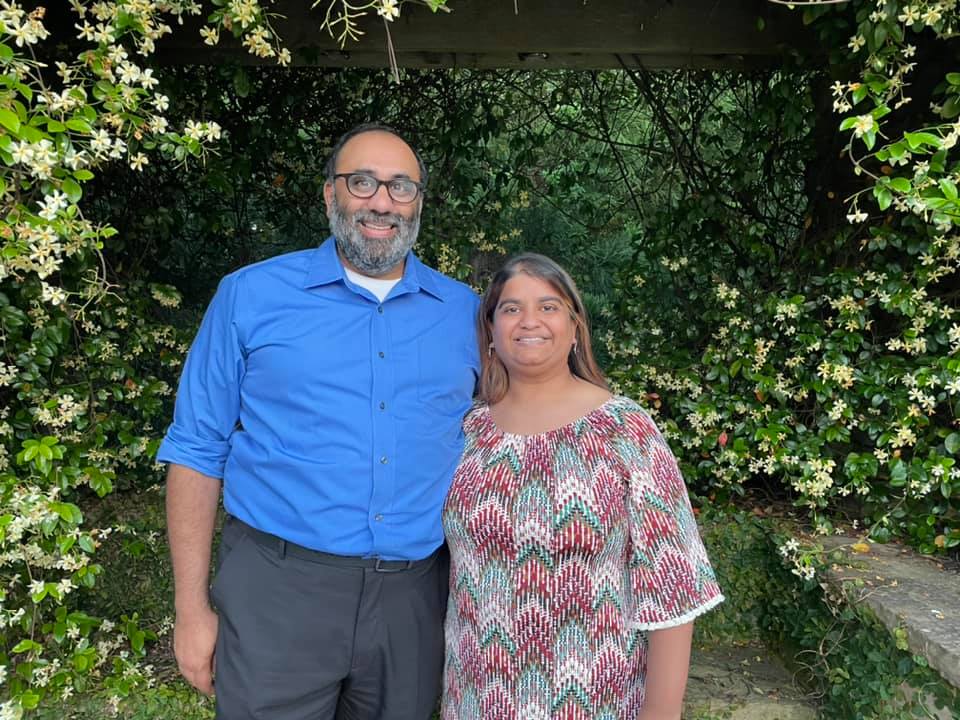
As the years have passed, the Rajajis have given help to many church members and those outside the church in an effort to show God’s love. They’ve also received help many times from their church family and have had to learn over and over again to accept help.
“We just make people take our help,” she laughed. “We [have been] served so well that we can’t say ‘no’ to people when they say, ‘Can we help you?’”
The week of the winter storm, Sonia had been praying specifically for a way to serve someone “over the course of time.” When she saw a Facebook post Brittani Fasske made one late night about delivering dinner to her husband who was out repairing customer’s pipes, she knew God was leading them to serve the Fasskes in a specific way.
“A lot of times people don’t know what they need,” Sonia said. She and Vijay had known the Fasskes as acquaintances through church, having served together at different times through the years. She knew they had two young children, they ran their business from home, that they were currently displaced from their home and normal routine, and she saw that Josh was working a crazy amount of hours doing a very necessary job in a moment of crisis. Their need became clear.
“We can work this into our schedule easily,” she realized. “We can do this as long as we need to because he needs to eat!”
Vijay was totally on board.
***
Brittani excitedly answered the phone when her husband called that night. She knew Vijay would have delivered the meal by now, as she had secretly helped by giving Vijay the address where Josh was working that night.
“I could tell he was emotional so that made me emotional,” she said.
“It just made me feel pretty special and important that they would take time out of their day to bring me food, which seems like something pretty small,” Josh said. “But when you’re working that much and not seeing your family, it’s actually something really huge. It really made me feel loved and taken care of.”
Josh also expressed the importance of being appreciated for his hard work in an extreme season.
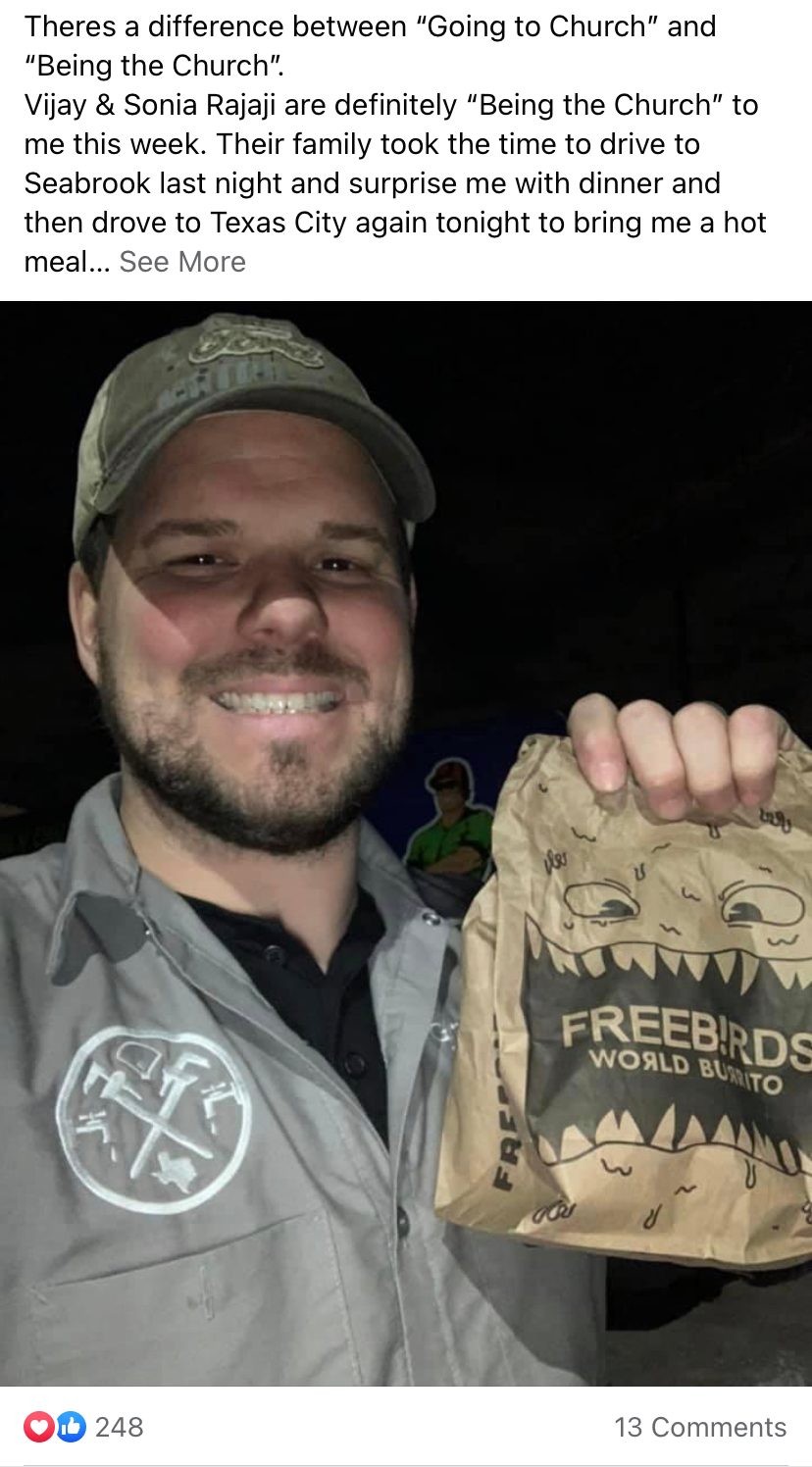 “A lot of times, working a lot of hours and irregular days in plumbing just seems normal,” Josh said. “Plumbing problems happen all the time, so it really becomes a normal thing that people don’t really think about. But when a natural disaster happens, long hours really get pushed to the extreme. A lot of times it goes unnoticed. But for somebody to realize, He’s away from his family. He’s not getting a good meal at night. For them to see that need and come running to help me out was really cool.”
“A lot of times, working a lot of hours and irregular days in plumbing just seems normal,” Josh said. “Plumbing problems happen all the time, so it really becomes a normal thing that people don’t really think about. But when a natural disaster happens, long hours really get pushed to the extreme. A lot of times it goes unnoticed. But for somebody to realize, He’s away from his family. He’s not getting a good meal at night. For them to see that need and come running to help me out was really cool.”
The friends took notice.
“They said, ‘That’s the kind of church I want to be part of. That’s the kind of love a church should show to their church family,’” recalled Brittani.
Once over the course of serving Josh, Vijay and his son, Samir, were able to also take a meal to one of Josh’s employees who was on a job with him. The man was dumbfounded by Vijay’s generosity.
“Seeing him ask questions like Why are you doing this for me? was so awesome,” Vijay recalled. “I have been praying that I will get to see him at church someday, his life changed.”
And it was not lost on Vijay that his son got to witness the exchange.
“We hope that by the way we live our lives our children see how you love people,” said Vijay.
“Being the church” was a theme that had the greatest impact on Josh during his chaotic work season.
“We want people to see the difference of a church that takes care of each other… and helps any way they can,” Josh said. “The people don’t just go to church; they go out and they are the church.”
“When a community is in need, our church and community steps up,” Brittani added. “It’s just like This isn’t a burden for us. This is my way to serve you. And they do it with an open heart and open mind. I always feel proud to be part of our community and our church.”
***
Sonia and Vijay continued to serve the Fasske family for another two months. Both families made it clear that serving is not just about being on the giving or receiving end — everyone benefits from service and generosity because it is simply an expression of God’s abundant love for his people.
“At first I thought I didn’t want to inconvenience anybody from taking time out of their day, even though it was a nice thought,” said Josh. “But I remembered back to when we were in a small group with Aaron Lutz. He once said, ‘You don’t want to take away somebody’s opportunity to serve you because it might be a next step of growth for them.’”
That “next step of growth” can be something life-changing or just another small way that God molds us further into the likeness of Christ – the one who has served us most generously. Sonia emphasized the importance of serving as a way to take the focus off ourselves to see others more clearly, the way God sees us.
“When we are serving others,” Sonia said, “it helps us grow in our devotion to God. This is one of the things we can do to try to diminish our selfishness and serve somebody else without expecting anything in return.”

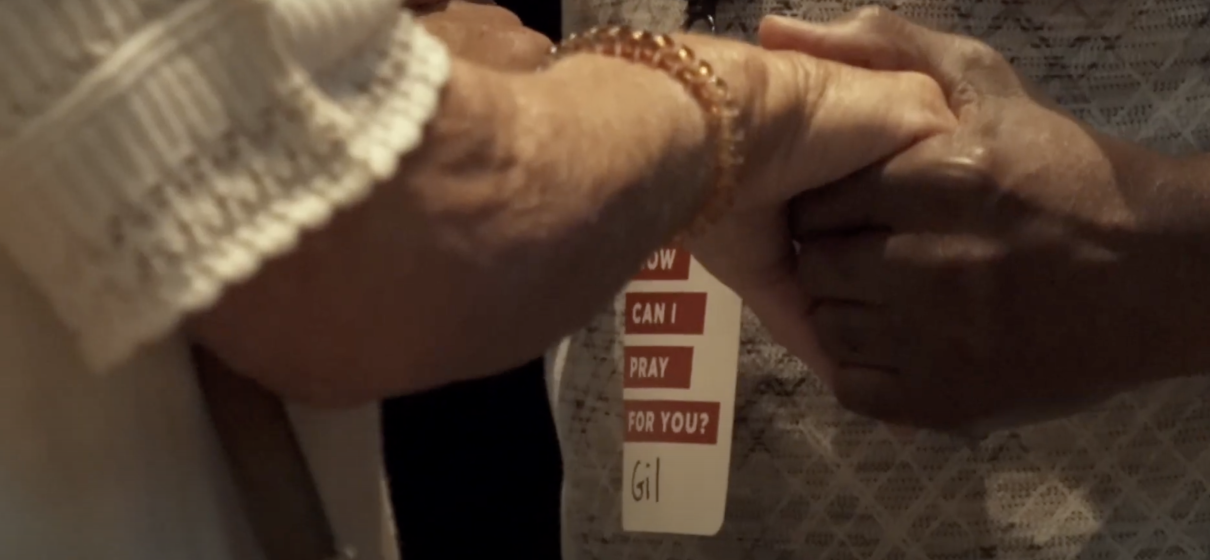


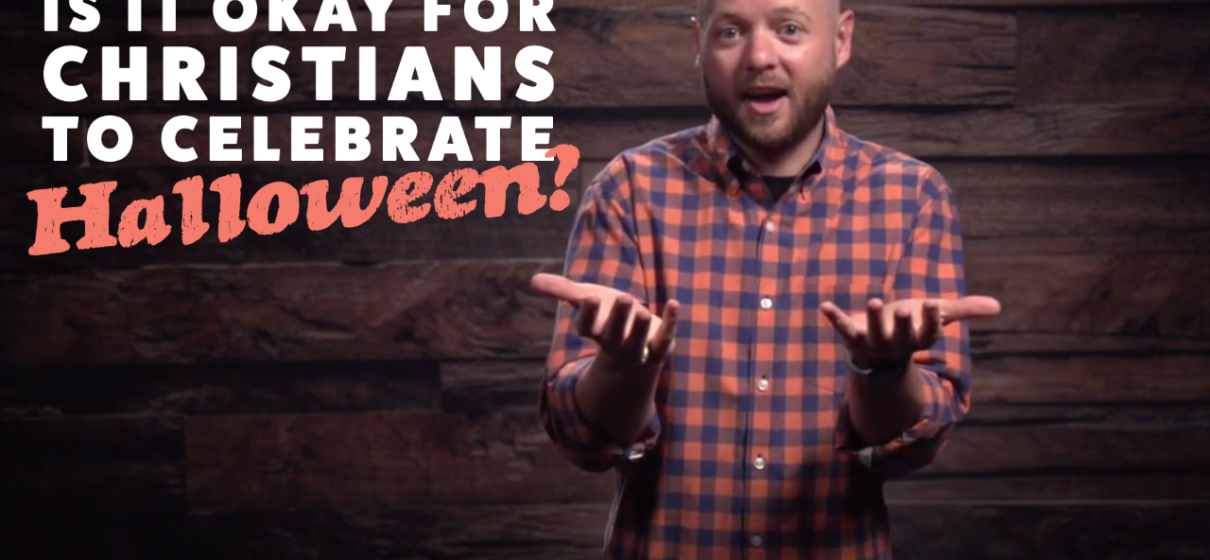

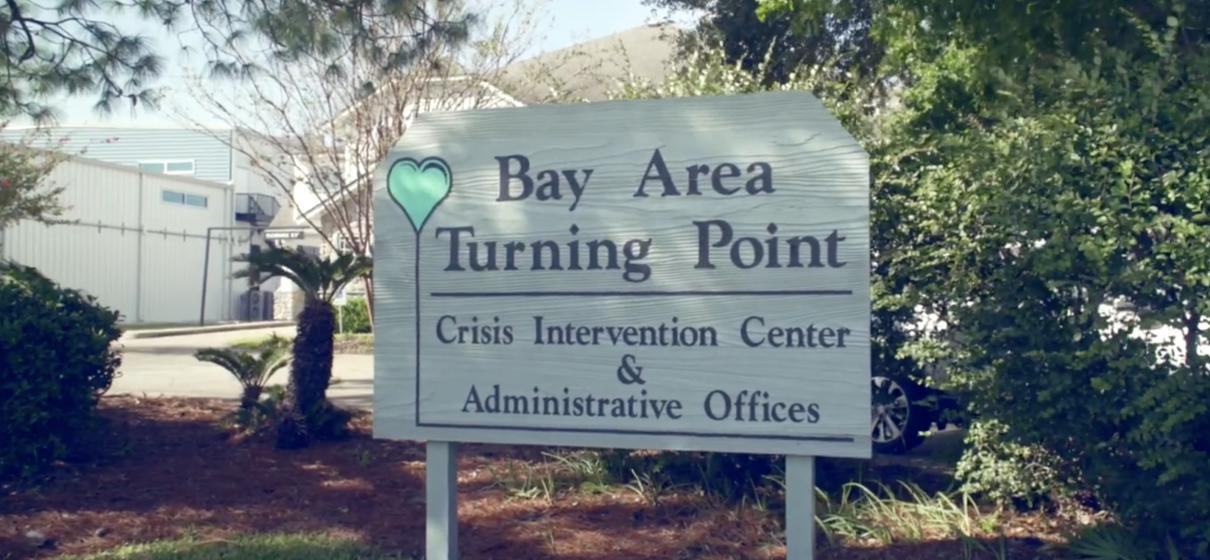


 The last few days had passed like a whirlwind for him and his wife, Brittani, owners of Grand Slam Plumbing, a small business they started in 2017. As Winter Storm Uri wreaked havoc in League City, Josh and his small crew worked long days and nights and even into the early hours of the morning to restore running water to their customers.
The last few days had passed like a whirlwind for him and his wife, Brittani, owners of Grand Slam Plumbing, a small business they started in 2017. As Winter Storm Uri wreaked havoc in League City, Josh and his small crew worked long days and nights and even into the early hours of the morning to restore running water to their customers.
 “A lot of times, working a lot of hours and irregular days in plumbing just seems normal,” Josh said. “Plumbing problems happen all the time, so it really becomes a normal thing that people don’t really think about. But when a natural disaster happens, long hours really get pushed to the extreme. A lot of times it goes unnoticed. But for somebody to realize, He’s away from his family. He’s not getting a good meal at night. For them to see that need and come running to help me out was really cool.”
“A lot of times, working a lot of hours and irregular days in plumbing just seems normal,” Josh said. “Plumbing problems happen all the time, so it really becomes a normal thing that people don’t really think about. But when a natural disaster happens, long hours really get pushed to the extreme. A lot of times it goes unnoticed. But for somebody to realize, He’s away from his family. He’s not getting a good meal at night. For them to see that need and come running to help me out was really cool.”